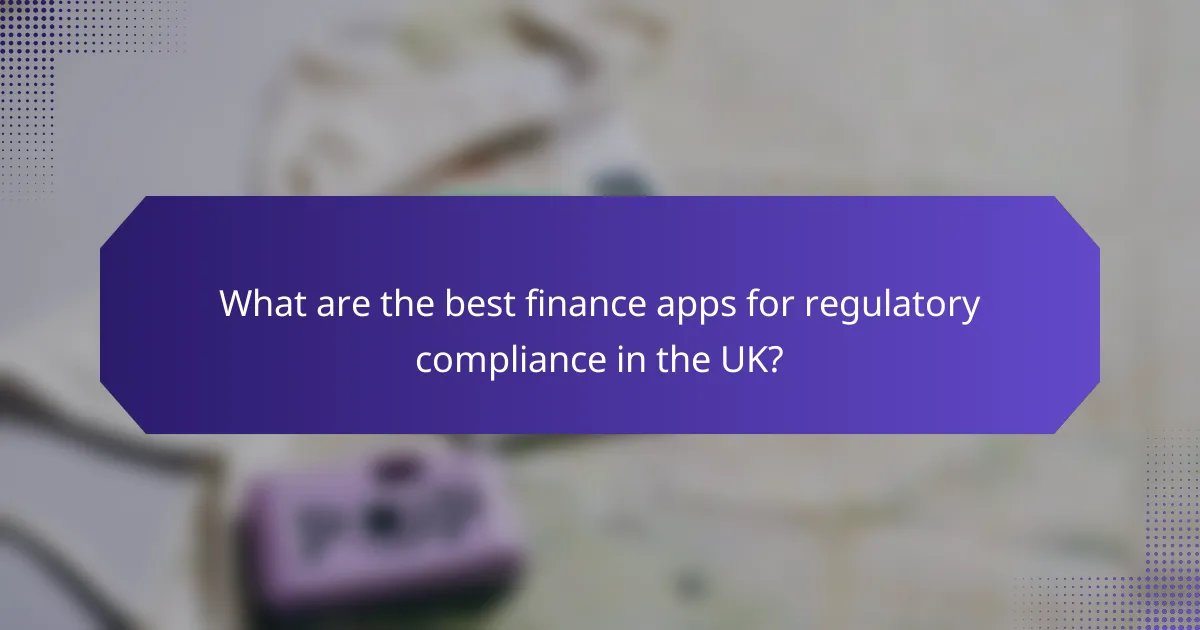In the rapidly evolving landscape of finance apps, regulatory compliance, security threats, and user trust are critical factors that shape their effectiveness and adoption. Apps that prioritize compliance not only help users navigate complex regulations but also implement robust security measures to protect sensitive data. By fostering transparency and providing reliable customer support, these apps can enhance user trust, ensuring a secure and compliant financial experience.

What are the best finance apps for regulatory compliance in the UK?
The best finance apps for regulatory compliance in the UK include solutions that effectively track compliance requirements, facilitate financial reporting, and provide timely regulatory updates. These apps help users navigate the complex landscape of financial regulations while ensuring security and user trust.
Revolut for compliance tracking
Revolut offers robust compliance tracking features that help users stay aligned with UK financial regulations. The app provides real-time insights into transactions, enabling users to monitor compliance with Anti-Money Laundering (AML) and Know Your Customer (KYC) regulations.
Users can easily access compliance reports and audit trails, which are essential for meeting regulatory requirements. This transparency fosters trust and ensures that users can demonstrate adherence to legal standards when required.
Monzo for financial reporting
Monzo simplifies financial reporting by providing users with clear, categorized transaction data that aligns with UK accounting standards. The app allows users to generate reports that can be easily shared with accountants or auditors, streamlining the financial review process.
Additionally, Monzo integrates with various accounting software, making it easier for users to maintain accurate financial records. This integration helps mitigate the risk of non-compliance due to reporting errors.
Starling Bank for regulatory updates
Starling Bank keeps users informed about the latest regulatory updates that may affect their financial activities. The app regularly provides notifications and insights into changes in financial regulations, ensuring that users remain compliant with evolving laws.
By offering educational resources and guidance on regulatory matters, Starling Bank empowers users to make informed financial decisions. This proactive approach enhances user trust and confidence in managing their finances within the regulatory framework.

How do finance apps ensure security against threats?
Finance apps implement a combination of advanced security measures to protect user data from various threats. Key strategies include encryption protocols, two-factor authentication, and regular security audits, all aimed at maintaining user trust and compliance with regulations.
Encryption protocols in finance apps
Encryption protocols are essential for safeguarding sensitive financial information within apps. These protocols convert data into a coded format, making it unreadable to unauthorized users. Common standards include AES (Advanced Encryption Standard) and TLS (Transport Layer Security), which are widely adopted in the industry.
When choosing a finance app, look for those that utilize end-to-end encryption, ensuring that only the sender and receiver can access the data. This adds an additional layer of security, particularly for transactions and personal information.
Two-factor authentication features
Two-factor authentication (2FA) significantly enhances security by requiring users to provide two forms of identification before accessing their accounts. This typically involves something the user knows, like a password, and something they have, such as a smartphone app or SMS code.
Finance apps that offer 2FA can help prevent unauthorized access even if a password is compromised. Users should enable this feature whenever possible to bolster their account security and protect their financial assets.
Regular security audits by fintech companies
Regular security audits are crucial for finance apps to identify and address vulnerabilities. These audits can be conducted internally or by third-party security firms, ensuring that the app adheres to industry standards and best practices.
Users should consider finance apps that undergo frequent security assessments and publicly share their audit results. This transparency can enhance user trust and confidence in the app’s ability to protect their financial data effectively.

What factors influence user trust in finance apps?
User trust in finance apps is primarily influenced by transparency, user feedback, and customer support. These elements help users feel secure about their personal and financial information while using the app.
Transparency in data usage
Transparency regarding data usage is crucial for building user trust in finance apps. Users want to know how their personal information is collected, stored, and shared. Clear privacy policies and straightforward explanations about data handling practices can significantly enhance user confidence.
Apps that provide detailed insights into their data protection measures, such as encryption and compliance with regulations like GDPR, are more likely to gain user trust. Regular updates about data usage policies also help maintain transparency.
User reviews and ratings
User reviews and ratings play a significant role in shaping perceptions of finance apps. High ratings and positive feedback can indicate reliability and security, while negative reviews may raise red flags for potential users. Prospective users often rely on platforms like app stores or financial forums to gauge the app’s credibility.
Encouraging satisfied users to leave reviews can enhance an app’s reputation. However, developers should also be prepared to address negative feedback constructively to demonstrate commitment to user satisfaction.
Customer support responsiveness
Responsive customer support is essential for fostering trust in finance apps. Users need assurance that they can quickly resolve issues or concerns related to their accounts. Effective support channels, such as live chat, email, or phone support, can significantly improve user experiences.
Apps that offer prompt responses, typically within a few hours, and provide clear solutions to common problems tend to build stronger user trust. Regularly updating users about support availability and response times can further enhance their confidence in the app’s reliability.

What are the regulatory requirements for finance apps in the UK?
Finance apps in the UK must comply with various regulatory requirements to ensure consumer protection and data security. Key regulations include those set by the Financial Conduct Authority (FCA) and the General Data Protection Regulation (GDPR), which govern financial services and data privacy, respectively.
FCA regulations for financial services
The Financial Conduct Authority (FCA) oversees financial services in the UK, requiring finance apps to obtain necessary licenses and adhere to strict operational standards. These regulations are designed to protect consumers and ensure fair competition in the financial market.
Finance apps must demonstrate compliance with principles such as treating customers fairly and maintaining adequate financial resources. Regular audits and reporting to the FCA are essential to maintain compliance and avoid penalties.
GDPR compliance for data protection
The General Data Protection Regulation (GDPR) mandates that finance apps handle personal data with strict care, ensuring transparency and user consent. Apps must implement robust data protection measures, including encryption and secure storage, to safeguard user information.
Under GDPR, users have rights regarding their data, such as the right to access, rectify, or delete their personal information. Finance apps must establish clear privacy policies and processes to facilitate these rights, ensuring compliance and building user trust.

How do finance apps handle user data security?
Finance apps prioritize user data security through various methods, including encryption and anonymization techniques. These strategies help protect sensitive information from unauthorized access and build user trust.
Data encryption methods
Data encryption is a crucial component of user data security in finance apps. It involves converting sensitive information into a code that can only be deciphered by authorized parties. Common encryption standards include AES (Advanced Encryption Standard), which is widely used for its strong security features.
Finance apps typically employ end-to-end encryption to ensure that data remains secure during transmission. This means that even if data is intercepted, it cannot be read without the proper decryption key. Users should look for apps that clearly state their encryption practices to ensure their data is adequately protected.
Anonymization of user information
Anonymization is the process of removing personally identifiable information from user data, making it impossible to trace back to individual users. This practice is essential for compliance with regulations like GDPR in Europe, which emphasizes user privacy.
Finance apps often use anonymization techniques to analyze user behavior without compromising personal identities. For example, they may aggregate transaction data to identify trends while ensuring individual transactions remain unlinked to specific users. Users should choose apps that prioritize anonymization to enhance their data privacy and security.

What are the emerging security threats to finance apps?
Emerging security threats to finance apps include various tactics that cybercriminals use to exploit vulnerabilities and gain unauthorized access to user data. Understanding these threats is crucial for both developers and users to maintain trust and security in financial transactions.
Phishing attacks targeting users
Phishing attacks are deceptive attempts to obtain sensitive information from users by masquerading as trustworthy entities. These attacks often occur through emails, texts, or fake websites that closely resemble legitimate finance apps.
To protect against phishing, users should verify the sender’s identity before clicking links or providing personal information. Implementing two-factor authentication can also add an extra layer of security, making it harder for attackers to gain access even if they obtain login credentials.
Malware and ransomware risks
Malware and ransomware pose significant risks to finance apps by infecting devices and encrypting data, demanding payment for access. These malicious software types can infiltrate systems through downloads, email attachments, or compromised websites.
To mitigate these risks, users should regularly update their devices and apps to patch vulnerabilities. Using reputable antivirus software can help detect and remove malware before it causes damage. Additionally, backing up important data can safeguard against ransomware attacks, allowing users to restore their information without paying the ransom.

How can users evaluate the security of finance apps?
Users can evaluate the security of finance apps by examining their encryption standards, regulatory compliance, and user reviews. Key factors include data protection measures, the app’s history of security breaches, and the transparency of its security practices.
Encryption Standards
Encryption is crucial for protecting sensitive financial data. Look for apps that use strong encryption protocols, such as AES-256, which is widely recognized as secure. Additionally, check if the app offers end-to-end encryption, ensuring that only you and the intended recipient can access your information.
Regulatory Compliance
Finance apps should comply with relevant regulations such as GDPR in Europe or CCPA in California. Compliance indicates that the app follows strict guidelines for data protection and user privacy. Verify if the app is regulated by financial authorities, which can provide an added layer of trust.
User Reviews and Reputation
User reviews can offer insights into an app’s security performance. Look for feedback regarding any past security incidents or breaches. A strong reputation, reflected in high ratings and positive user experiences, can indicate a reliable finance app.
Security Features
Evaluate the security features offered by the app, such as two-factor authentication (2FA) and biometric login options. These features enhance security by adding extra layers of verification. Ensure that the app allows you to set up alerts for suspicious activities, enabling you to respond quickly to potential threats.










